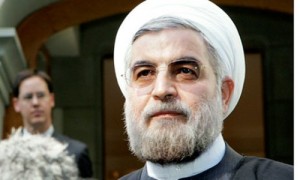 Hassan Rowhani†is politically astute, and has a vision for a more moderate regime, writes Jack Straw
Hassan Rowhani†is politically astute, and has a vision for a more moderate regime, writes Jack Straw"Itís time for us all to go and see the president,Ē Hassan Rowhani suddenly told my French and German counterparts, Dominique de Villepin and Joschka Fischer, and me, across a large conference table in a foreign-ministry building in south Tehran. It was October 21 2003, the first of the many ďE3Ē (now ďE3+3Ē) negotiating meetings with the Iranians about their nuclear dossier.
The plan had been that, once we had reached agreement in this early morning meeting, weíd all go across town at 10.30am to present ourselves to President Khatami, Mr Rowhaniís boss. But 10.30am had come and gone without agreement.
ďThereís nothing to see him about,Ē I said. ďOur planes are at the airport,Ē Dominique chipped in. ďAnd weíre perfectly happy to go and get on them,Ē added Joschka. There was consternation on the Iranian side. But Rowhani quickly regained his composure. An adjournment was agreed. We then watched as he worked the phones to the president, and, crucially, to Supreme Leader Ayatollah Khamenei, to gain greater freedom of manoeuvre. It showed impressive flexibility. After a round of tough negotiations, we got a deal: the Tehran Declaration.
As the secretary of Iranís National Security Council, Rowhani was at the heart of Iranís foreign and security policy during Khatamiís eight-year term, which ran from 1997 to 2005, but his experience at the centre goes back to the 1980-88 Iran-Iraq war. I met him several times during my five trips to Tehran as foreign secretary.
In manner, he could not be a greater contrast with the outgoing President Mahmoud Ahmadinejad. While the latter always came across as something of a Dave Spart, like the Eighties-era Ken Livingstone, Rowhani is naturally courteous, respectful, and engaged. Heís straightforward and pragmatic to deal with Ė but intensely protective of Iran, its people, and of the Islamic revolution.
The mistake that many in the West make about Iran is to write it off as a one-man show, a dictatorship of the Supreme Leader. Power and governance in Iran is highly complex. The leader is supreme, but even he has to take account of the competing forces that make up the Iranian establishment, from the Revolutionary Guards and the rest of the security apparatus, the clerics (of whom Rowhani is one), the parliament and the elected president. Surviving unscathed in this environment, especially during the ugly parts of Ahmadinejadís tenure, has required the skills of a medieval courtier, with a care to avoid the block. As Sir Richard Dalton, British ambassador in Tehran from 2003 to 2006, has commented, Rowhani has ďconnections across all points of the political compass in IranĒ.
Rowhani is quick to smile, but thereís a tough inscrutability there, too. Itís my guess that, by keeping his own counsel, he managed to reassure the Supreme Leader, and the ďGuardian CouncilĒ that vets all election candidates, that he would be a safe establishment choice. It was only in the closing days of the election campaign that he opened up, with great force, and spelt out a vision for Iran, for ďmoderationĒ to replace ďextremismĒ, for a resolution of the nuclear issue, and a restoration of economic prosperity. By then, he correctly calculated, it was too late for any of the forces of darkness which so poisoned the 2005 election to be able to damage him.
But Supreme Leader Khamenei, who has never enjoyed the mystical status nor theological domination of his predecessor Khomeini, the founder of the republic, has to have a care for his own survival. He knows that thereís a natural majority against the narrow conservatism which he represents, and he could well have judged that it would be wise for him to allow the more reformist views a legitimate voice.
Rowhaniís election could be the best news in many years for the future of the whole region Ė for Iran, its economy, and for the nuclear problem, with respect to Syria, Iraq, and Israel and Palestine.
There are, however, two dangers. The first is to assume that nothing has changed Ė that Rowhani is merely a better-dressed Ahmadinejad. This is the essence of the belligerent comments from Benjamin Netanyahu, the Israeli prime minister, in the wake of Rowhaniís victory. They are unthinking and self-defeating.
The second danger is to assume that everything has changed, and to expect too much too quickly from Rowhani. Our Government should seek to re-open full diplomatic relations with Iran, but he wonít take office until early August. He has to choose a cabinet Ė and have his ministers endorsed by the parliament (far from a formality). He has to negotiate with the leader, and the powerful Revolutionary Guards, before he can negotiate with the West. While it will be a huge relief to do business with him, he is a Shia and an Iranian, and intensely proud of being both. But show him and his nation patience, respect and understanding, and thereís a possibility that the 10 years of ďE3+3Ē meetings which started in south Tehran in 2003 might, just, have a happy ending.
This Article was written by†Jack Straw for the Telegraph on June 16, 2013.†Jack Straw†is a former foreign secretary and the co-chairman of the All-Party Parliamentary Group on Iran.
The Iran Project is not responsible for the content of quoted articles.










